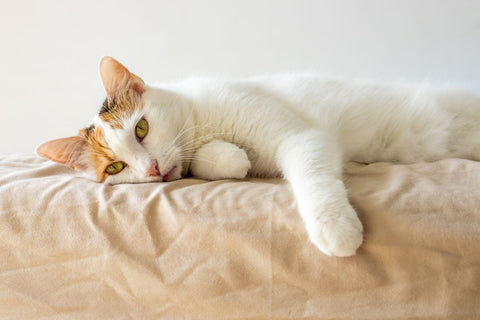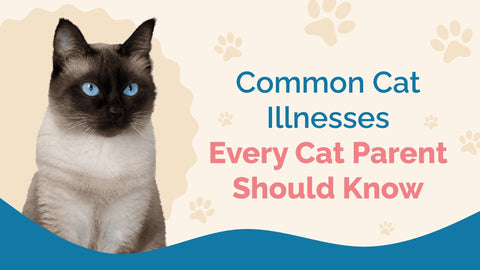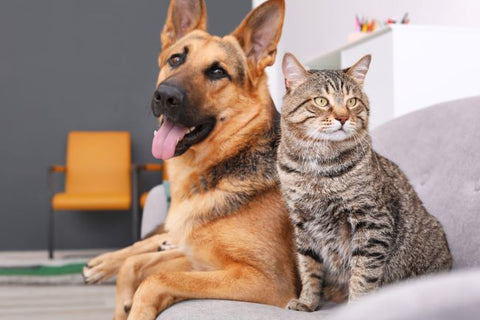

FIV+ Cats: What Every Cat Parent Needs to Know
Feline Immunodeficiency Virus (FIV) is a serious condition related to feline leukemia virus infection. This disease weakens a cat’s immune system, especially in adult cats, making them more likely to get sick from infections and other illnesses. It is crucial to understand FIV, especially if your kitty is diagnosed with it or if they may be at risk. Let’s look into what FIV is, how it spreads, and how to support a cat living with FIV.
What is FIV?
FIV stands for feline immunodeficiency virus. It is a virus that weakens a cat’s immune system throughout its cat’s life. This is similar to how HIV affects humans. A main point to remember is that FIV only affects cats. Your feline friend cannot give FIV to you or other animals, just other cats.
When cats get an infection, they might not show any signs of illness for several years. Still, the virus gradually reduces their immune system's strength. This weakens them and makes it easier for them to catch other infections.
How is FIV Transmitted?
The most typical way FIV spreads is through bite wounds. This means cats that are outdoors or live with many other cats and often get into fights have a higher risk. The most common mode of transmission for FIV is through deep bite wounds, and FIV can also spread in some less common ways, such as:
-
A mother cat can spread the infection to her kittens when she gives birth or while nursing.
-
It can also spread through close contact, such as when they groom each other, but this is very rare.
FIV does not spread when cats share food bowls. It also does not spread through litter boxes or casual contact.
Symptoms of FIV in Felines
Felines that have FIV can feel good for several years. But, as the virus becomes stronger, you may begin to see signs of illness.
-
Frequent infections like skin, gum, and lung infections
-
Weight loss
-
Poor coat condition
-
Fever
-
Tiredness or changes in behavior
If your furry friend shows any of these signs, you should speak to your veterinarian. They can help you get the right diagnosis and care.
Diagnosis of FIV
A vet can tell if a cat has FIV by doing a blood test for FIV antibodies. If your cat tests positive, don't panic! Many FIV+ felines can lead long and healthy lives when they get proper care.
How to Care for a Cat with FIV
Caring for a kitty with FIV takes some extra effort. This helps make sure they are happy and healthy.
-
Regular Vet Checkups - Take your pet to the vet every six months. Catches any health issues early to help a lot.
-
High-Quality Diet - Feed them a balanced diet. This helps their immune system stay strong. Avoid raw food diets because FIV felines can get bacterial infections easily.
-
Keep Them Indoors - Keep your cat safe inside. This lowers their risk of infections. It also helps stop FIV from spreading to other cats.
-
Stress Management - Lower their stress levels. A calm space can keep their immune system strong. You can use calming products if needed.
-
Support Their Immune System - Consider natural supplements, like Prana Pets’ Immunity Blend, to help your cat's immune system and overall health.
articlebanners1
Preventing FIV
The best way to prevent FIV is to keep your cat indoors. If your cat goes outside, watch them closely. This can help reduce the chances of them meeting other infected animals. It's also important to take your cat to the vet regularly to avoid fights. If you have more than one cat, introduce new cats slowly. This can help stop any aggressive behavior. Spaying or neutering your cats can also reduce aggression and lower the chance of bite wounds.
Can FIV Be Prevented with Vaccines?
FIV cannot be fully prevented with vaccines, but there is one that helps reduce the risk of infection. Not every kitty needs this vaccine. You should discuss it with your vet based on your cat's lifestyle and risk factors. It’s also very important to keep your pet indoors or watch them closely when outside. Regular checkups with your vet can help stop FIV from spreading.
Treatment Options for FIV+ Cats
Treatment for FIV+ cats focuses on managing their symptoms and supporting their immune system. Vets may provide antiviral medications to help with secondary infections. Currently, there is no FIV vaccine available, which can lead to false positives in test results. A healthy diet, lowering stress, boosting their immune system, and offering a loving home are crucial for improving the lives of FIV+ cats. Finding the disease early and giving good care can greatly impact their health.
Diet and Nutrition for FIV+ Cats
A healthy and balanced diet is really important for FIV+ cats. It helps them stay strong and keeps their immune function working well. A good diet should have high-quality protein, Omega-3 fatty acids, and vitamins. It is essential to avoid foods that could carry parasites, as these can be harmful to FIV+ cats. You should talk to your vet for advice on the best food for your cat. A well-rounded diet can greatly improve their overall health and quality of life.
Emotional Support and Attachment in FIV+ Cats
Emotional support and attachment are really important for FIV+ cats as they manage their condition. These cats do better in a loving and stable home. A safe place where they feel cared for can make a big difference. Spending time with your cat, showing comfort, and creating a secure space can help reduce their stress and worry. Remember, your love and presence can really help your FIV+ cat feel better and improve their lives.
FIV+ Cat Integration into Multi-Cat Households
Bringing an FIV+ cat into a home with other cats requires careful planning. It's important to ensure that all pets and housemates feel safe. A good way to do this is by introducing the cats slowly. You should also set up separate feeding spots and litter boxes. This can help prevent fights and lower stress for everyone. Regular vet visits for all the cats are crucial. A simple blood test can check their health and help stop the spread of FIV. With patience and good management, FIV+ cats can live happily with other cats.
Coexistence with Non-FIV Cats and Other Pets
Coexisting with non-FIV cats and other pets can be successful if managed well. It is the responsibility of the adopter to keep an FIV+ cat indoors. This helps prevent the virus from spreading to other animals. Watching all pets for any signs of illness is important. Also, make sure their vaccinations are up to date. Providing separate spots for eating and sleeping can help reduce the chance of spreading the virus. With proper care and attention, you can create a happy home for all your pets.
Living with an FIV-Positive Cat
An FIV diagnosis does not mean a cat can't live well. With love and care, FIV-positive cats can still have happy lives. A positive result might seem scary, but these cats can surprise you. They are strong and love life, purring joyfully along the way, just like the champions they are! For more information and support, consider visiting Alley Cat Allies.
By staying updated on information and doing something active, you can help your cat remain healthy and happy, no matter their diagnosis.
The Impact of FIV on Life Expectancy
The impact of FIV and FeLV on a cat's lifespan can vary. Cats that test positive for FIV may not live as long as those who do not have the infection. Still, with good care and regular vet visits, they can enjoy happy lives for many years. By providing a loving and supportive environment, you can help your FIV+ cat thrive, even when faced with challenges.
Have Questions About FIV?
Prana Pets is here to help you! Take a look at our natural supplements made to keep your cat healthy. If you want more tips, feel free to reach out to our team. Together, we can make life with FIV easier for you and your furry friend.
articlebanners2




